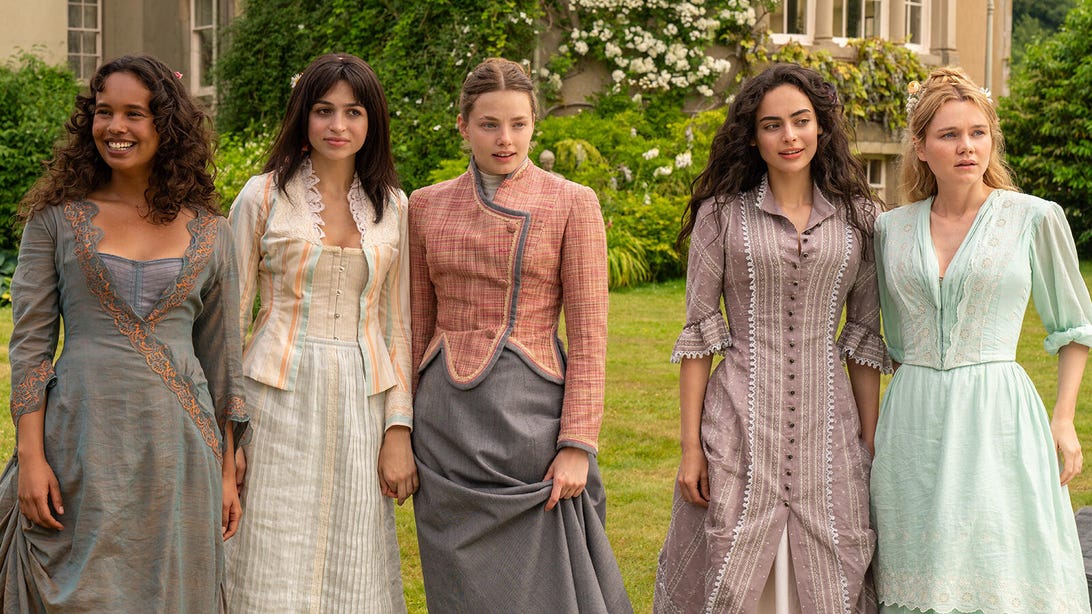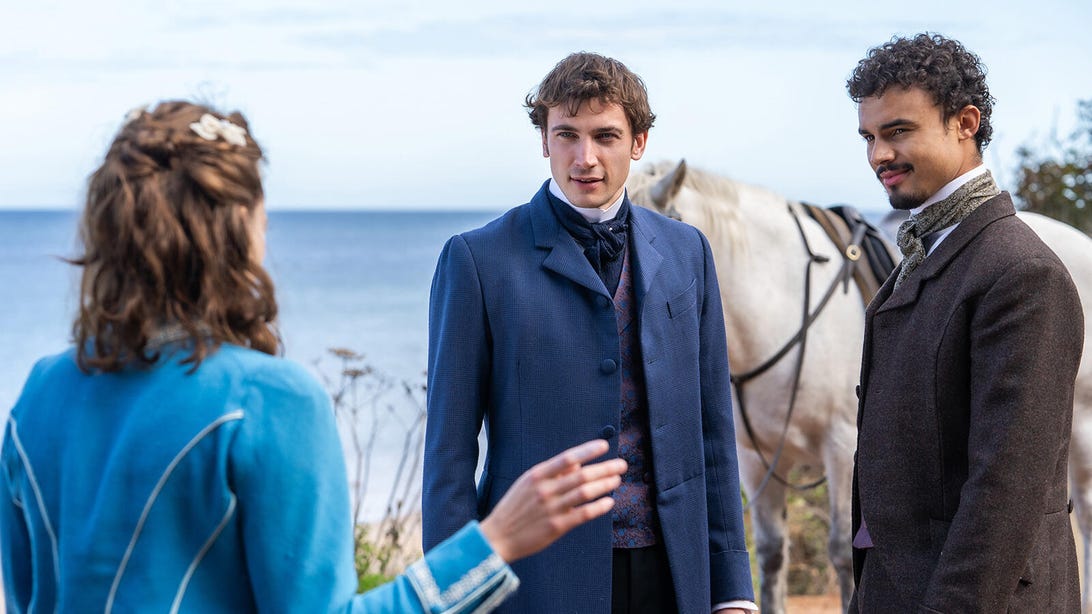Join or Sign In
Sign in to customize your TV listings
By joining TV Guide, you agree to our Terms of Use and acknowledge the data practices in our Privacy Policy.
The Buccaneers Creator on the Bridgerton Comparisons and Why She's Telling More Modern Stories
'We love Bridgerton!'

Alisha Boe, Josie Totah, Kristine Frøseth, Aubri Ibrag, and Imogen Waterhouse, The Buccaneers
Apple TV+Apple TV+'s new period drama, The Buccaneers, is not a carbon copy of Bridgerton, though creator Katherine Jakeways acknowledges that comparisons will inevitably be made. On paper, there are similarities: Both take place in the 19th century (The Buccaneers during the Gilded Age, Bridgerton in the Regency era). Both are set in England (The Buccaneers also features New York City). Both deal with debutante balls and marriage contracts. Both feature a modern-inspired soundtrack. And both showcase the extravagance of the time. But that's about where the parallels end.
Adapted from Edith Wharton's unfinished 1937 novel, The Buccaneers puts the spotlight on five young new-money American women, led by Nan St. George (Kristine Frøseth), as they move across the Atlantic to find husbands and attempt to move up society's ladder. The oil-and-water tension and culture clash between the free-spirited Americans and the stiff upper lip of the British is one obvious difference from the Netflix juggernaut.
"Our characters have more complicated, slightly more modern-feeling storylines in a way that you don't always get in period dramas," Jakeways tells TV Guide, which described the series as "soapy, irreverent fun." "You get the joy of the way the Americans react to the English and the way the English behave in horror at the amazingly vivacious Americans who arrive."
Each of the women endure their own romantic trials throughout the course of the series, but it's their unbreakable bond that Jakeways deems "the love story of the show." The creator and head writer discusses the eight-episode first season, portraying romances of all kinds, and why she's not worried about Bridgerton comparisons.
More on The Buccaneers:
- The Buccaneers: Everything We Know About Season 1
- The Buccaneers Review: Apple TV+'s Edith Wharton Adaptation Is Soapy, Irreverent Fun
TV Guide: The Buccaneers is based on an unfinished novel by Edith Wharton. What were the challenges or surprises in bringing this adaptation to the small screen?
Katherine Jakeways: Edith Wharton died, sadly, while she was writing the novel so she never got to finish it. That has mattered to us less than you might think because the starting point of her novel is so well-written and so well thought through. We haven't made any attempts to finish the novel. What we've done is use the first third of the book, which is so beautifully written and the characters are so rich and so modern-feeling already, and used that as a jumping off point for stories that we could tell and the relationship dramas that these characters have. But more importantly, the story of their friendship. The five girls who come over [to London] are the characters that Edith Wharton wrote. The absolute heart of the book is their love story of the five of them and the way that they look out for each other and move together and laugh together and make mistakes together and have rivalries and betray each other, to a certain extent. But fundamentally, at the end of the day, they will always put each other first.
Even though the series is set in the late 19th century, the characters feel like they can very much live in the modern era. What are the parallels that can be drawn from what they go through in the 1870s that translate to today?
Jakeways: A lot of the characters, but specifically the five young women, can live at any time. I think that they are an example of what female friendship feels like and the way that groups of young women, but women of all ages, are around each other. They may have certain characteristics when they're individuals, but when they come together as a group, it's "She's the funny one," "She's the brave one," or "She's the one who looks out for the others." That may not necessarily always be the case because everybody is complicated and no one is just one characteristic, but they do have these roles within the group.
And then they go off and have their own adventures and their disasters and their own romances. But when they come back together, it's about how the five of them are together and the laughs that they have. What's fascinating is Edith Wharton wrote [the novel] in the 1930s and it was set 50 years previously, so she was already modernizing it herself. When we're watching period dramas, often you can go, "That's interesting; that was what it was like," but it doesn't necessarily resonate with you [where you say], "That's what it's like for me and my friends." I hope that through modernizing it in this way, we're almost reaching a hand out from history to say, yeah, they're just like us. These girls are having experiences and fears and passions and jealousies just like we do. Through doing that, you can understand any period of history in a different way because it suddenly makes it feel very real and feel just like experiences that we've had or that our friends have had or our families have had.
Comparisons have been made to Bridgerton because both shows are set around the same time period and, at least on paper, have many similarities — from the marriage contracts to the extravagant galas to the ornate costumes. How is The Buccaneers different?
Jakeways: We love Bridgerton, that's the first thing I should say. Gosh, we hope we have a fraction of their [success]. We were developing The Buccaneers before Bridgerton had been on, so it was in production already. I think it has stuff in common. Of course it's a period drama, there's the costumes, the locations, the romance is what you would expect in a period drama. I think perhaps our characters have more complicated, slightly more modern-feeling storylines in a way that you don't always get in period dramas. We have used some storylines which wouldn't have been seen in other period dramas about relationships that absolutely were happening in the 19th century but weren't written about or spoken about. We've tried to feature all different types of relationships.
The obvious factor is that we have this culture clash of the Americans. We go back and forth a little bit between New York and England, but the main characters are the Americans who have come over. You get the joy of the way the Americans react to the English and the way the English behave in horror at the amazingly vivacious Americans who arrive in their silent living rooms. We've got lots to compare, and lots that are similar and lots that are different [to Bridgerton]. But I hope there's lots of space for all of us in this world.
Having the American perspective be the centering part is an interesting shift from what we typically see in British-set period dramas. Even from the first few episodes, there is palpable tension between how the American women view the British traditions, and vice versa.
Jakeways: When they first arrive, of course you lean into the stereotypes of the British being very stiff and being repressed and being unwelcoming to change. And the Americans being very loud and being free and being more able to interact with people than the British can. I hope over the course of the series, both sides realize they have more in common than not. I hope there is a bit more nuance in that as time goes on. There's lots of comic potential in there in that initial clash and it's absolutely something that we've leaned into.

Kristine Frøseth, Guy Remmers, and Matthew Broome, The Buccaneers
Apple TV+Romance is a big marker in period dramas like The Buccaneers. You mentioned showcasing relationships that aren't typically given screen time. The journey of Josie Totah's character, Mabel Elmsworth, throughout the series is a particular highlight, as well as Nan's complex love triangle between Guy Thwarte (Matthew Broome) and Theo, the Duke of Tintagel (Guy Remmers). What can you tell us about the romances that will be chronicled on the show?
Jakeways: I love watching period dramas and there's absolutely nothing wrong with it being about a boy meets a girl and will they get married at the end? Oh yes, they have gotten married in the end. But what's interesting about this is Conchita (Alisha Boe) gets married in the first five minutes of the show and what you see with her relationship is what's actually like being married. For several of them, who get married over the course of the series, we're examining what happens after that "I do" moment.
The love triangle [between Nan, Guy and the Duke], we wanted to make it a bit more complicated than the normal love triangle. Often there's one choice that the heroine has to make that's obviously the right choice and one that's obviously the wrong choice. We were really interested in how we could make both of the romantic options for Nan viable, and ones we might change our minds over the course of the series about which one we think she should be with and what choices she should make.
In terms of Mabel, we were really keen to include a queer storyline in the show. It was very obvious that that would be a story that we wanted to tell alongside the other romances. We were really hoping, and I hope that we've succeeded, in getting that story to be as romantic and as joyful. They'll have issues that they face and they inevitably have to be a bit more secret about it, which is part of it, but the actual romance between the two characters is just as romantic and just as joyful and just as fun to spend time with. We didn't want it to be a sad storyline. Far from it. We wanted them to be a real love story just as much as the other characters.
The first three episodes of The Buccaneers begin streaming Wednesday, Nov. 8 on Apple TV+, with new episodes dropping weekly through Dec. 13.